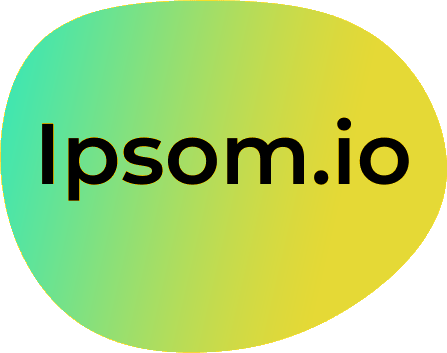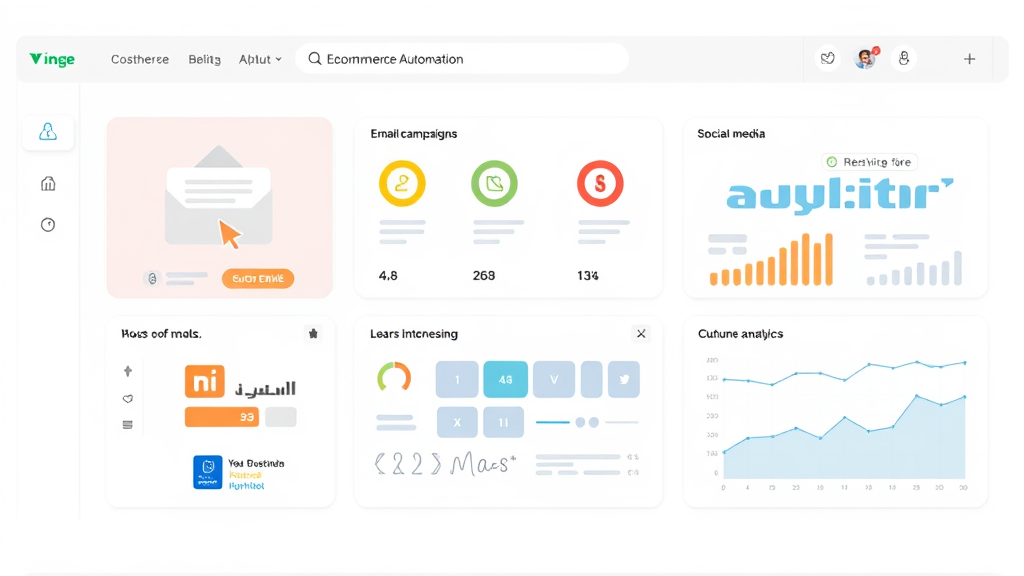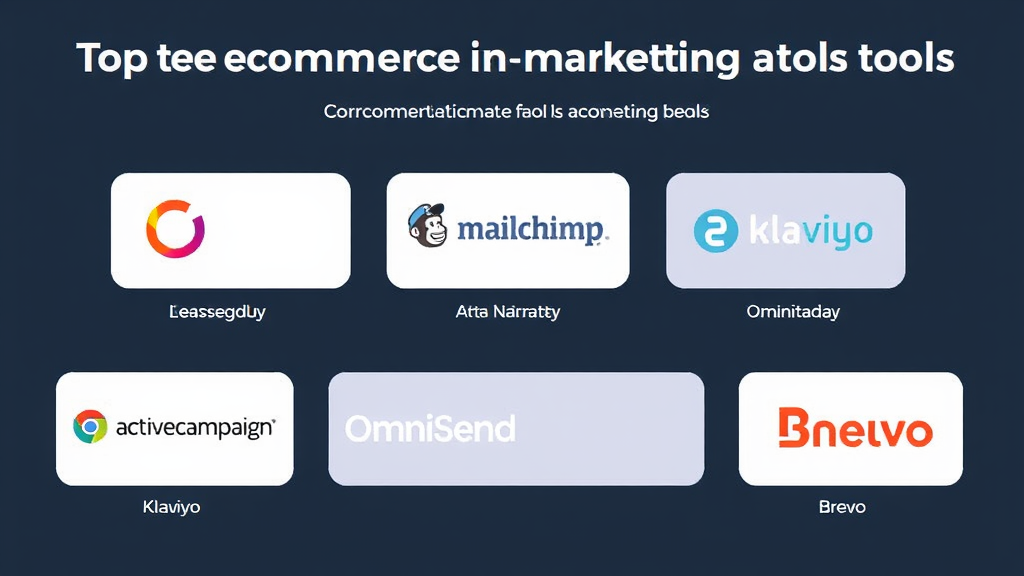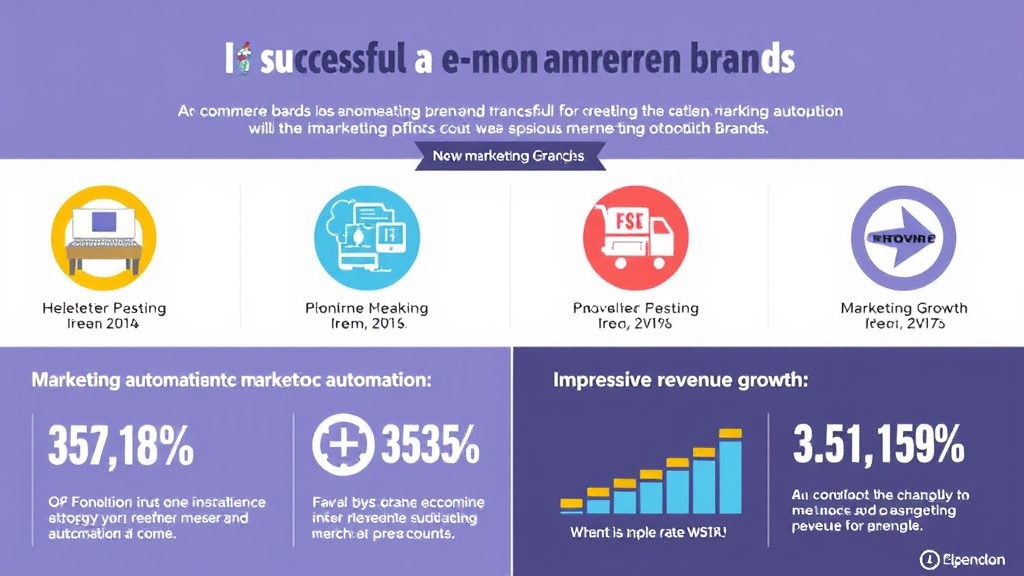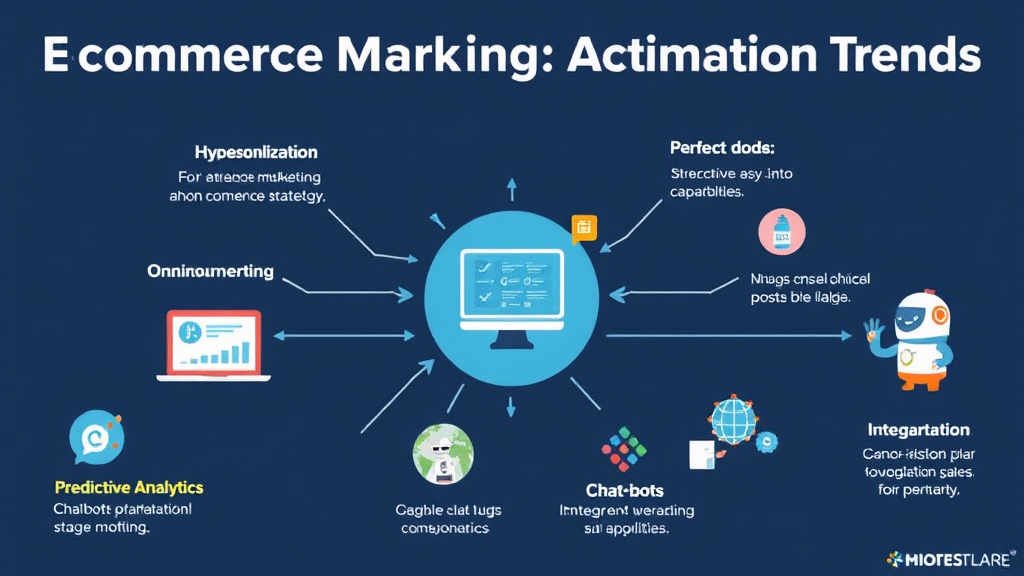Ecommerce marketing automation leverages technology to streamline and enhance marketing efforts, enabling businesses to deliver personalized experiences, improve customer engagement, and boost sales. By automating repetitive tasks, companies can focus on strategic initiatives and foster stronger customer relationships.
Key Findings
-
Enhanced Customer Segmentation: Automation tools allow for precise segmentation based on purchase history, browsing behavior, and demographics, facilitating targeted and relevant marketing campaigns.
-
Improved Customer Engagement: Automated workflows enable timely and contextual communications, nurturing customer relationships and promoting long-term loyalty.
-
Increased Efficiency and Cost Savings: By automating repetitive tasks, businesses can save time and reduce operational costs, allowing focus on strategic growth initiatives.
-
Data-Driven Decision Making: Automation tools provide valuable insights into marketing performance, enabling continuous optimization and improved return on investment.
-
Personalized Customer Experiences: Leveraging AI, businesses can deliver personalized content and recommendations, enhancing customer satisfaction and increasing conversion rates.
Understanding Ecommerce Marketing Automation: Definition and Importance
Ecommerce marketing automation involves using software and technology to automate repetitive marketing tasks within an online retail environment. This includes activities such as sending emails, managing social media posts, overseeing ad campaigns, and tracking customer behavior. The primary objective is to streamline marketing efforts, making them more efficient and personalized.
Key Benefits of Ecommerce Marketing Automation:
-
Time Savings: By automating routine tasks, businesses can free up valuable time, allowing teams to focus on strategic initiatives.
-
Enhanced Customer Experience: Automation enables the delivery of timely and relevant messages, improving the overall customer journey.
-
Improved Targeting: Businesses can segment their audience based on behaviors and preferences, facilitating more personalized marketing campaigns.
-
Increased Efficiency: Automating processes reduces the likelihood of human error and ensures consistency across marketing efforts.
By implementing ecommerce marketing automation, businesses can enhance operational efficiency, deliver personalized customer experiences, and drive higher conversion rates.
External Sources: Learn More
Transform your business today—start your journey with ipsom.io or connect with us at office@ipsom.io.
Key Benefits of Implementing Marketing Automation in Ecommerce
Implementing marketing automation in e-commerce offers several key benefits that can significantly enhance business performance and customer satisfaction.
Improved Customer Segmentation and Personalization
Marketing automation enables businesses to segment customers into specific groups based on factors such as purchase history, browsing behavior, demographics, and engagement levels. This allows for the delivery of highly personalized and relevant messages, offers, and promotions to each segment, increasing the likelihood of conversion.
Enhanced Customer Engagement and Retention
By leveraging automated workflows and triggers, businesses can send timely and contextual communications, nurturing customer relationships and promoting long-term loyalty. Automated re-engagement campaigns can also help reactivate lapsed customers, reducing churn rates.
Increased Operational Efficiency and Time Savings
Automation streamlines and automates manual tasks, saving time and resources. By eliminating repetitive marketing activities, teams can focus on more strategic and creative initiatives, leading to enhanced productivity and streamlined workflows.
Higher Revenue and Sales
Marketing automation facilitates personalized product recommendations and upselling opportunities, leading to higher average order values and increased revenue. Automated campaigns, such as abandoned cart recovery emails, help recover lost sales by re-engaging customers and boosting conversion rates.
Consistent Omnichannel Engagement
Automation software enables businesses to deliver a consistent customer experience across multiple channels, such as email, SMS, push notifications, and social media. This ensures a cohesive brand image and seamless customer interactions.
Data-Driven Decision Making
Marketing automation provides access to detailed analytics, allowing businesses to track and analyze customer interactions. This data-driven approach helps in making informed decisions for continuous improvement and optimization of marketing strategies.
By integrating marketing automation into e-commerce operations, businesses can achieve greater efficiency, improved customer relationships, and increased profitability.
External Sources: Learn More
Transform your marketing with ease—unlock the power of ipsom.io or get in touch at office@ipsom.io.
Top Strategies for Effective Ecommerce Marketing Automation
Implementing effective marketing automation strategies is crucial for enhancing customer engagement and driving sales in e-commerce. Below are key strategies to consider:
1. Triggered Email Campaigns
Automate emails based on specific customer actions, such as abandoned carts, recent purchases, or browsing history. This approach increases relevance, leading to higher open rates and conversions.
2. Dynamic Personalization
Tailor content to individual customers by analyzing their data and behaviors. Personalized product recommendations can significantly boost engagement and sales.
3. Customer Segmentation
Divide your audience into specific groups based on demographics, purchase history, or engagement levels. This allows for highly targeted marketing messages, increasing the likelihood of conversion.
4. Chatbots for Customer Service
Deploy AI-driven chatbots to provide instant customer support, answer FAQs, and guide purchases. This enhances the customer experience while reducing the workload on your support team.
5. Lead Scoring
Assign scores to leads based on their likelihood to convert. This helps prioritize marketing efforts toward the most promising prospects.
6. Automated Landing Pages
Utilize marketing software to create optimized landing pages efficiently. These pages can improve lead generation and user experience.
7. Upselling and Cross-Selling
Suggest related or higher-value products to customers based on their purchase history. This strategy can increase average order value and overall revenue.
By integrating these strategies, e-commerce businesses can create a more personalized and efficient marketing approach, leading to improved customer satisfaction and increased sales.
External Sources: Learn More
Choosing the Right Marketing Automation Tools for Your Ecommerce Business
Selecting the appropriate marketing automation tools is crucial for enhancing the efficiency and effectiveness of your ecommerce business. Below are some top-rated platforms tailored for ecommerce needs:
1. ActiveCampaign
ActiveCampaign offers a comprehensive suite combining email marketing, automation, and CRM functionalities. Its visual editor allows for the creation of automated workflows, and it provides over 600 prebuilt automation recipes for personalized campaigns across email, social media, chat, and text messaging. ActiveCampaign integrates seamlessly with platforms like Shopify, WooCommerce, Magento, Stripe, and BigCommerce.
2. Mailchimp
Originally an email marketing service, Mailchimp has evolved into a full-featured marketing platform suitable for small and medium-sized enterprises. It simplifies campaign creation, execution, and analysis with its user-friendly design. Key features include a campaign manager, customer journey builder, A/B testing, and behavioral targeting. Mailchimp integrates with ecommerce platforms such as Shopify, BigCommerce, Magento, and WooCommerce.
3. Klaviyo
Klaviyo is designed specifically for data-driven ecommerce businesses, focusing on personalized email and SMS marketing automation. It enables the creation of detailed customer profiles and segmentation, allowing for highly targeted campaigns. Features include automated email and SMS campaigns, abandoned cart emails, and back-in-stock notifications. Klaviyo integrates with major ecommerce platforms like Shopify, BigCommerce, Magento, and WooCommerce.
4. Omnisend
Omnisend is an omnichannel marketing automation platform tailored for ecommerce businesses. It facilitates engagement through email, SMS, and push notifications, offering pre-built automation workflows for various stages of the customer journey. Omnisend integrates with all major ecommerce platforms, including custom platforms via their API.
5. Brevo (formerly Sendinblue)
Brevo provides a range of features, including marketing automation, targeted email marketing, SMS marketing, and a sales CRM. It's well-suited for ecommerce businesses needing lead scoring and small-scale campaigns. Brevo offers a free plan allowing up to 300 emails per day and integrates with various ecommerce platforms.
When choosing a marketing automation tool, consider factors such as the size of your business, specific marketing needs, budget, and the level of integration required with your existing ecommerce platform. Many of these tools offer free trials or plans, allowing you to assess their suitability for your business before committing to a subscription.
External Sources: Learn More
Transform your workflow and enhance efficiency—experience ipsom.io or email us at office@ipsom.io.
Case Studies: Successful Ecommerce Marketing Automation Implementations
Implementing marketing automation in e-commerce has led to significant successes for various brands. Below are detailed case studies highlighting how specific companies have effectively utilized marketing automation to enhance their operations and achieve remarkable results.
Every Man Jack: Enhancing Revenue with AI-Powered Flows
Every Man Jack, a personal care brand, faced challenges with their reorder reminder emails, which were misaligned with their customers' product usage cycles. By integrating Klaviyo's AI-driven predictive analytics, they tailored their automated repurchase flows to coincide with the predicted next order dates of their customers. This strategic adjustment resulted in a 25% year-over-year increase in revenue from these automated flows.
Tatti Lashes: Driving Revenue Through SMS Automation
European beauty brand Tatti Lashes recognized the mobile-centric behavior of their customer base and implemented SMS marketing flows. By offering exclusive discounts to new subscribers and sending personalized messages for events like birthdays, they amassed 40,000 SMS subscribers in just three months. Their SMS welcome flow achieved a 30% click rate and a 9% conversion rate, contributing to 35% of their owned marketing revenue.
Haute Hijab: Personalizing Customer Engagement
Haute Hijab aimed to replicate the in-store experience online by developing an onsite quiz to understand individual customer preferences. Utilizing marketing automation, they segmented audiences based on quiz responses and purchase behaviors, enabling personalized email and SMS campaigns. This approach led to a 30% increase in average order value.
Sock Club: Streamlining Sales with Automated Workflows
Sock Club transitioned from manual email blasts to automated follow-up sequences targeted at e-commerce leads. This shift improved open and conversion rates while reducing the average sales cycle length from 22 days to just 11.
TruWood: Boosting ROI with SMS Marketing
TruWood, a Canadian e-commerce brand specializing in wooden watches, implemented an automated SMS marketing strategy targeting visitors who abandoned their shopping carts. By segmenting customers based on cart value and sending personalized messages with limited-time discounts, they achieved a return of $62 for every $1 invested.
PennStation: Increasing Sales Through Marketing Automation
PennStation, an e-commerce brand providing office supplies, faced declining customer engagement. By adopting a marketing automation strategy that monitored sales from open leads to closed-won opportunities, they improved sales efficiency, re-engaged former customers, and increased purchase frequency through cross-selling, leading to a 50% increase in sales.
Vitrazza: Enhancing Revenue with Personalized Welcome Emails
Vitrazza, a company designing luxurious glass chair mats, revamped their welcome email series to highlight unique selling propositions and include customer testimonials. This personalized approach led to a 55% increase in revenue and a 20% boost in click-through rates, generating $564,200 in revenue within four months.
Dell: Utilizing GIFs in Email Campaigns
Dell introduced a new product using GIFs in their email marketing campaigns, allowing customers to view the product directly within their inboxes. This innovative approach resulted in a 109% increase in sales through email marketing efforts.
Envelopes.com: Recovering Sales with Abandoned Cart Emails
Envelopes.com addressed cart abandonment by implementing A/B tested email campaigns sent at different intervals after a cart was abandoned. This strategy helped identify the optimal time to re-engage prospects, leading to a 40% improvement in conversion rates.
Draper James: Leveraging AI for Personalized Email Content
Draper James, a women's clothing brand, utilized AI-powered engines to generate personalized email content based on customers' past purchases. This approach resulted in a tenfold increase in new customers and a 30% rise in repeat customers.
Argos: Re-Engaging Customers with Personalized Emails
UK-based retailer Argos tackled cart abandonment by sending personalized follow-up emails based on customers' browsing history and past interactions. By suggesting similar products and offering incentives, they successfully re-engaged prospects and increased sales from previously abandoned carts.
Eternity Modern: Scaling Revenue with Automated Email Workflows
Eternity Modern, a furniture store, implemented automated email workflows, including welcome emails, cart abandonment flows, and product suggestions. By segmenting their audience and maintaining regular communication, they increased monthly revenue from $80,000 to $289,000 within a year.
ASOS: Boosting Engagement with Personalized Recommendations
ASOS focused on tailoring the shopping experience by analyzing individual customer behaviors and preferences to curate product suggestions. This personalized approach led to a 28% increase in click-through rates.
Amazon: Recovering Sales with Cart Abandonment Emails
Amazon addressed cart abandonment by sending timely reminders to users about items left in their shopping carts, accompanied by incentives like discounts or free shipping. This strategy resulted in a 20% increase in conversion rates.
Tumblr: Enhancing User Engagement with Email Segmentation
Tumblr automated email campaigns to deliver personalized content, leading to a doubling of original posts, tripling of likes, and a fivefold increase in reblogs per user.
Snatcher: Recovering Revenue with Cart Recovery Automation
Snatcher, an e-commerce retailer, implemented Omnisend's cart recovery automation, resulting in a 50% email open rate and a 74% increase in revenue, recovering over $120,000.
Shapeways: Increasing Engagement with Personalized Emails
Shapeways used Mailchimp's tags and tag-based automations to segment its audience and send personalized emails, leading to a 238% increase in open rates and a 525% increase in click-through rates.
Red Hot Marketing: Maximizing Revenue Through Automated Workflows
Red Hot Marketing utilized GetResponse MAX's automated workflows and segmentation features, generating up to $1,000 for every 1,000 emails sent for unique offers, with some offers reaching over $100 in effective cost per mille (ECPM).
These case studies demonstrate the transformative impact of marketing automation in e-commerce, highlighting strategies such as personalized email campaigns, SMS marketing, AI-driven content, and automated workflows that have led to substantial increases in engagement, conversion rates, and revenue.
External Sources: Learn More
Simplify your workflows and boost efficiency—learn more at ipsom.io or get in touch via office@ipsom.io.
Future Trends in Ecommerce Marketing Automation
Ecommerce marketing automation is rapidly evolving, with several key trends shaping its future:
Hyper-Personalization with AI-Driven Insights
Advancements in artificial intelligence (AI) and machine learning are enabling businesses to analyze customer data—such as browsing habits, purchase history, and demographics—to deliver highly personalized experiences. This includes dynamic product recommendations and tailored email content that respond to customer behavior in real time. Such hyper-personalization enhances customer satisfaction, improves conversion rates, and reduces churn.
Omnichannel Automation for Seamless Customer Experiences
Consumers interact with brands across multiple channels, including email, social media, websites, and mobile apps. Omnichannel marketing automation ensures a consistent and engaging experience across all these touchpoints by unifying customer interactions. This approach leads to higher customer satisfaction and loyalty, as it meets expectations for a seamless brand experience.
Predictive Analytics for Proactive Marketing
Predictive analytics leverages historical data and AI algorithms to anticipate future customer behaviors and needs. By analyzing patterns within data, businesses can deliver relevant and targeted marketing content, leading to increased conversion rates and greater client satisfaction.
Conversational Commerce via Chatbots and Virtual Assistants
The integration of AI-driven chatbots and virtual assistants is revolutionizing customer interactions in ecommerce. These tools provide instant responses to common queries, assist with product recommendations, and guide customers through the purchasing process. By offering 24/7 support and reducing wait times, chatbots enhance the overall shopping experience and can lead to higher conversion rates.
Enhanced Integration Capabilities
As the marketing technology landscape becomes more complex, seamless integration across various platforms and tools is essential. Enhanced integration capabilities in marketing automation systems ensure that multiple technologies work together efficiently, creating unified and customized interactions with customers across all touchpoints. This approach maximizes efficiency and results, whether integrating with ecommerce platforms, CRM systems, or analytics tools.
By embracing these trends, businesses can stay ahead in the competitive ecommerce landscape, delivering personalized, seamless, and proactive marketing experiences that meet evolving customer expectations.
External Sources: Learn More
Transform your business and embrace effortless growth—check out ipsom.io or connect with us at office@ipsom.io.
FAQ – Frequently Asked Questions
What is ecommerce marketing automation?
Ecommerce marketing automation involves using software tools to automate and streamline marketing tasks in online retail, enhancing efficiency and personalizing customer interactions to boost sales.
Key components include:
-
Email Automation: Sending targeted emails based on customer actions, such as welcome messages or reminders for abandoned carts.
-
Customer Segmentation: Dividing customers into groups based on behavior or demographics to deliver personalized marketing messages.
-
Chatbots and AI Integration: Utilizing AI-powered chatbots to provide instant customer support and product recommendations.
-
Social Media Automation: Scheduling posts and automating responses to maintain consistent engagement across platforms.
-
Personalized Product Recommendations: Suggesting products based on a customer's browsing history or past purchases to enhance the shopping experience.
Implementing these strategies can lead to increased efficiency, improved customer engagement, and higher sales for ecommerce businesses.
How does marketing automation improve customer engagement?
Marketing automation enhances customer engagement by enabling personalized communication, efficient lead management, and timely interactions. It allows businesses to deliver tailored messages based on customer behavior and preferences, ensuring relevant content reaches the right audience at the right time. Automated workflows streamline lead nurturing, improving conversion rates and fostering long-term relationships. Additionally, marketing automation facilitates multi-channel integration, providing a consistent and cohesive customer experience across various platforms. By automating repetitive tasks, businesses can focus on strategy and creativity, ultimately boosting customer satisfaction and loyalty. (twilio.com, 360view.com, kentico.com)
What are the key features to look for in a marketing automation tool?
When selecting a marketing automation tool, consider the following key features:
-
Lead Management and Scoring: Effectively track and prioritize potential customers based on their interactions and engagement levels.
-
CRM Integration: Ensure seamless synchronization with your Customer Relationship Management system to maintain consistent and up-to-date customer data.
-
Advanced Segmentation and Personalization: Deliver tailored content by segmenting your audience based on behavior, demographics, and preferences.
-
Multi-Channel Campaign Management: Coordinate and manage campaigns across various platforms, including email, social media, and mobile, to provide a unified customer experience.
-
Analytics and Reporting: Access comprehensive insights into campaign performance to inform data-driven decisions and optimize marketing strategies.
-
Workflow Automation: Automate repetitive tasks such as email sequences and lead assignments to enhance efficiency and consistency.
-
Social Media Integration: Schedule, publish, and monitor social media content directly from the platform to streamline social marketing efforts.
-
Mobile Optimization: Ensure that emails, landing pages, and other content are optimized for mobile devices to reach users effectively on any platform.
-
Security and Compliance: Adhere to industry standards and regulations to protect customer data and maintain trust.
-
Scalability: Choose a tool that can grow with your business, accommodating increasing data and more complex marketing needs over time.
Evaluating these features will help you select a marketing automation tool that aligns with your business objectives and enhances your marketing efforts.
Can small businesses benefit from ecommerce marketing automation?
Yes, small businesses can significantly benefit from e-commerce marketing automation. It streamlines repetitive tasks like email campaigns and social media posts, enhancing operational efficiency. Automation also enables personalized customer interactions, improving engagement and retention. Additionally, it provides valuable insights through data analysis, aiding in informed decision-making and business growth.
How do I measure the success of my marketing automation efforts?
To measure the success of your marketing automation efforts, focus on the following key performance indicators (KPIs):
-
Engagement Metrics:
- Open Rate: Percentage of recipients who open your emails.
- Click-Through Rate (CTR): Percentage of recipients who click on links within your emails.
- Conversion Rate: Percentage of users who complete a desired action, such as making a purchase.
-
Efficiency Metrics:
- Time Saved: Reduction in manual work due to automation.
- Workflow Efficiency: Effectiveness of automation in moving customers through the sales funnel.
-
Customer-Centric Metrics:
- Customer Retention Rate: Percentage of customers who continue doing business with you over time.
- Customer Lifetime Value (CLV): Total revenue expected from a customer over their relationship with your business.
- Churn Rate: Percentage of customers who stop engaging or making purchases.
-
Revenue & ROI Metrics:
- Revenue per Campaign: Amount of revenue each automated campaign generates.
- Overall Return on Investment (ROI): Comparison of marketing automation costs to revenue generated.
Regularly monitoring these KPIs will help you assess and optimize your marketing automation strategies.
